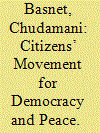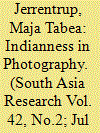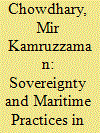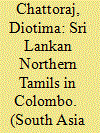|
|
|
Sort Order |
|
|
|
Items / Page
|
|
|
|
|
|
|
| Srl | Item |
| 1 |
ID:
185177


|
|
|
|
|
| Summary/Abstract |
Based on interviews with journalists, political party leaders and civil society activists, this article examines and illustrates the strategic capacities of leadership in Nepalese efforts to bolster the movement for democracy. With the help of Bourdieu’s concepts of social, cultural and symbolic capitals, the article provides insights into the crucial role of key individuals as leaders and examines their skilful use of activist synergies to spearhead significant political change in Nepal. The study demonstrates how a seemingly resource-poor movement can nevertheless mobilise the popular masses against an autocratic ruler.
|
|
|
|
|
|
|
|
|
|
|
|
|
|
|
|
| 2 |
ID:
185172


|
|
|
|
|
| Summary/Abstract |
Post-independence Indian science as a medium of national development offers an opportunity to engage with the West beyond the straightjacket of domination and subordination. This ambivalence is reflected in the conception and materialisation of Indian Institutes of Technology (IITs), established under the guidance of Western powers to strengthen India’s technological progress. Being delivered from the West, IITs created conditions of sameness and difference, leading to a situation where the West and India transformed each other, with major implications for ideas of development and nationhood. This article focuses on IITs, particularly IIT Kanpur, as a site of collaboration and contestation, where engineering and politics often crossed, negotiated and resisted each other. This also led to situations where science’s materialisation through machines, such as computers, blurred the experiential difference between the West and India. Such boundary crossings created new scientific subjectivities that traversed beyond the nation and de-territorialised the practice of science.
|
|
|
|
|
|
|
|
|
|
|
|
|
|
|
|
| 3 |
ID:
185179


|
|
|
|
|
| Summary/Abstract |
This article explores the question whether there is a specifically Indian style of photography. A survey of photography students from various institutions revealed that though there is little clarity about the actual look of an Indian style of photography, students clearly define their own photographs as Indian. Intriguingly, the focus is less on certain visual characteristics, but more on the feelings they derive from the photographs, a scenario which is reminiscent of the rasa theory. Even though this was hardly mentioned by the students, this psycho-social element seems to have left a cultural imprint but also reflects an act of claiming ownership and agency. In addition, the students identified alienating aspects in photography, such as seeing one’s own culture like an outsider, but at the same time consider it to be integrating, since photography paves the way for a deeper engagement with one’s own culture, and as such strengthens Indianness.
|
|
|
|
|
|
|
|
|
|
|
|
|
|
|
|
| 4 |
ID:
185178


|
|
|
|
|
| Summary/Abstract |
This study examines long-term trends in the labour market outcomes of young urban female graduates in India. Using nationally representative employment data, we find that a rise in the adjusted labour force participation rate of young educated women (15–29 years) between 1999 and 2000 and 2011–12 was not accompanied by a corresponding improvement in their access to suitable employment opportunities. We provide evidence of the inability of the labour market to effectively absorb the increasing shares of higher qualified young urban females into formal regular jobs. Further, a gendered comparison of trends depicts the presence of continuing gender discrimination. In such a scenario, the discouraging effects may either keep many educated young women in a state of unemployment or result in their withdrawal from the labour force.
|
|
|
|
|
|
|
|
|
|
|
|
|
|
|
|
| 5 |
ID:
185175


|
|
|
|
|
| Summary/Abstract |
With its several innovative features, the Mahatma Gandhi National Rural Employment Guarantee Scheme (MGNREGS) is considered to be a game changer for rural India. Assessing the first 15 years of its implementation, this article mainly presents collated key data on its performance in various Indian states and then seeks to explain why some indicators may look less successful in different states. Many factors contribute to variations in MGNREGS performance, but what effects were observed in economically backward states to protect impoverished rural Indians from sinking into distress scenarios? Based on the official figures, the article explores answers for the period of 2006–21.
|
|
|
|
|
|
|
|
|
|
|
|
|
|
|
|
| 6 |
ID:
185173


|
|
|
|
|
| Summary/Abstract |
Much literature covers how the rise of the Bharatiya Janata Party (BJP) in India impacted on the political marginalisation of Muslims, while it has not been examined in sufficient depth how the internal dynamics of Congress contributed to this decline in Muslim nominations for elections. This article examines the Congress party’s organisational circumstances that affected Muslims’ electoral representation in 1980s Gujarat. It demonstrates that, along with the influence of competing Hindutva forces, the ongoing ‘deinstitutionalisation’ of the Congress party also damaged the political representation of Muslims. Interview accounts and archival documents indicate how factional fighting within Congress subverted the faction-like consolidation of the Muslim leaders’ negotiation power. The article argues that despite vertical and dyadic ties with Hindu leaders inside the party, Muslim Congressmen could not attain unified leadership to generate sufficient pressure on the party to nominate Muslims for elections.
|
|
|
|
|
|
|
|
|
|
|
|
|
|
|
|
| 7 |
ID:
185174


|
|
|
|
|
| Summary/Abstract |
This article examines how far existing work on the Indian Ocean has focused on aspects like sovereignty and maritime law in the western Indian Ocean and argues for more research in this field. The conduct of shipping in the western Indian Ocean took a drastic shift during the period from 1700 to 1900 when an organised admiralty law was drafted in India, indicating that the role played by the British in this process cannot be disregarded. Highlighting the struggle between various European powers for supremacy over maritime trade and commerce in the Indian Ocean by analysing the available sources, this article identifies numerous gaps in studies of the Indian Ocean, which need further scholarly exploration.
|
|
|
|
|
|
|
|
|
|
|
|
|
|
|
|
| 8 |
ID:
185176


|
|
|
|
|
| Summary/Abstract |
The Sri Lankan conflict that officially ended in 2009 resulted not only in large numbers of Tamils leaving the country to join the vast global Tamil diaspora but also created many internally displaced persons (IDPs) from Sri Lanka’s Northern Tamil communities who settled in Colombo. This article examines the idea of home among such IDPs, showing how broken memories of an earlier home and different approaches towards return shape feelings of being an ‘insider’ or ‘outsider’ among Tamil IDPs in Colombo. Drawing on the life experiences of such IDPs, the article shows that they now often view Colombo as a more suitable home yet are still ‘becoming insiders’ rather than ‘being insiders’.
|
|
|
|
|
|
|
|
|
|
|
|
|
|
|
|
|
|
|
|
|